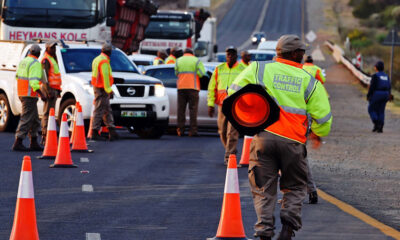News
South Africa’s Online Betting Boom: Big Wins, Bigger Losses for Ordinary Citizens

South Africa’s online betting boom: When chasing wins becomes a national habit
For many South Africans, the thrill of placing a small bet on a weekend soccer match or spinning a digital slot has become as routine as checking social media. But according to a new Bureau for Economic Research (BER) report released this week, the country’s fast-growing online sports betting boom is spiraling into a serious financial and social crisis.
The report paints a striking picture: R1.5 trillion was wagered during the 2024/2025 financial year a jump from R1.1 trillion the year before, and the equivalent of 0.8% of South Africa’s GDP.
The BER calls betting “the new national norm,” fuelled by easy-to-use mobile apps, constant advertising, and round-the-clock access. But behind the record turnover lies a worrying truth, South Africans are gambling with money meant for food, school fees, and debt repayments.
The illusion of winnings: R1.5 trillion doesn’t mean R1.5 trillion earned
While the headline figures may suggest a booming economy, most of that R1.5 trillion wasn’t new money. The BER clarified that 95% of all bets were recycled, winnings bet again in a cycle of hope and loss.
Still, the gambling industry pocketed record profits. Gross Gambling Revenue (GGR), the amount operators keep after payouts, surged from R52.3 billion to R75 billion, a 26% rise in one year, following another 25% increase the year before.
Since 2020, online betting has overtaken casinos as the dominant form of gambling in South Africa, nearly doubling its share of total consumer spending.
“Online betting is no longer just a pastime, it’s become a major player in the economy, and that comes with consequences,” the BER noted.
The shifting culture of spending
Even though South Africans still spend more on beer than on gambling, the report found a significant cultural shift: gambling now accounts for 26.7% of all spending on recreation and culture, compared to 12.3% before the pandemic.
In other words, as disposable income shrinks, more people are turning to betting as both escape and strategy hoping for a jackpot to cover next month’s bills.
The Old Mutual Savings and Investment Monitor (2025) adds weight to the concern. It found that 40% of working South Africans gamble regularly to cover expenses or pay off debt, up from 36% the previous year.
Even more worrying, 1 in 5 gamblers admitted to borrowing money or selling assets to fund their habits.
‘Digital danger’: When your casino lives in your pocket
Experts warn that the rise of mobile betting has made gambling dangerously accessible.
Professor David Spurrett from the University of KwaZulu-Natal explained it best:
“It’s easier to avoid a casino than to avoid your phone. Expanding access inevitably increases harm.”
The constant exposure to sports sponsorships, betting ads, and influencer partnerships makes gambling seem like a harmless hobby, especially to younger South Africans.
A study by infoQuest showed that while overall gambling participation dipped slightly, digital betting among 18–34-year-olds is skyrocketing. For many, betting apps are not just entertainment they’re a side hustle, a hope, or even a coping mechanism.
The rising human toll: Addiction, depression, and debt
The National Gambling Board’s 2024/25 report offers perhaps the clearest sign of trouble:
calls to the National Responsible Gambling Programme (NRGP) helpline spiked by 623%, jumping from 140,000 to over one million in a single year.
Problem gambling has climbed to 31%, up from 6% in 2017, while referrals for counselling have surged by 55%. Among youth aged 18–35, treatment referrals more than doubled in the last year alone.
Psychiatrists like Dr James Burger warn that this isn’t just a financial issue, it’s a mental health crisis in the making.
“We’re seeing rising cases of depression, substance abuse, domestic conflict, and even suicide linked to gambling addiction,” he said.
Public sentiment: ‘Everyone knows someone’
Scroll through South African Twitter or TikTok, and the stories are everywhere. Young adults betting on Premier League matches to make rent. Taxi drivers glued to betting apps during breaks. University students bragging about “winning streaks”, only to borrow money days later.
The betting boom has become a shared national experience, and so too has its pain.
In communities where unemployment is high and hope is thin, the promise of a quick payout feels like the only shot at financial freedom. But as many are discovering, the house almost always wins.
Where do we go from here?
While the government collects taxes from the industry, critics argue that regulation hasn’t caught up with technology. Ads for betting companies dominate sports broadcasts and online platforms, yet few safeguards exist for vulnerable users.
The BER’s warning is clear: South Africa’s gambling economy is growing faster than its ability to manage it.
If left unchecked, the country could face not just a financial crisis, but a social one, where digital addiction quietly deepens inequality and despair.
Until stronger measures are in place, South Africans may continue to chase quick wins, even as the odds and the debts, keep stacking up.
{Source: IOL}
Follow Joburg ETC on Facebook, Twitter , TikTok and Instagram
For more News in Johannesburg, visit joburgetc.com



























